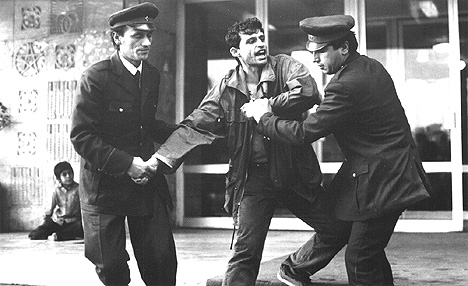We also meet, among others, a once-articulate street thespian advocating simple living and non-violence who is shown today to be a nearly incoherent proponent of capitalism and chaos; a clergyman who related well to youths with "soul," and who now works with the poor, exhorting former hippies to return to Haight-Ashbury with their money; nude members of the Sexual Freedom League, and workers both then and now in the district's Free Medical Clinic. But too often O'Connell falls back on rapid-fire montages that say more about media and advertising appropriation of psychoactive imagery than the essence of the movement itself. He's promised to show "what our hippie revolution was all about" and in doing so reveals that he is as enamored with the trappings of the movement as he is with penetrating the myths.
Emma
at the Guild 45th
written and directed by Douglas McGrath
adapted from the novel by Jane Austen
|
In the little town of Highbury, England, in the early 1800s, a small group of the insulated upper class, for whom painting, dancing, gossip and laughter are consuming absorptions, is gathered for dinner in a large, exquisitely appointed dining room. The suspiciously bright candlelight catches their best sides and gives the room a hypnotic radiance. Director McGrath is careful to have one of his actors rotate a knife slightly so that it glimmers in our direction - once, twice, perhaps three times. I turn to look at my companion. She's fast asleep.
Jane Austen's Emma is, on one side of the knife, a comedy of manners and manipulation. It's about a self-satisfied young woman who spends her time interfering in the love lives of others and therefore is in danger of missing out on love herself. On the other side of the knife, it's a razor sharp satire of class conceit revealing the lack of genuine kindness in the charity of the upper classes. The former provides abundant material for an entertainment that goes down easy, if one gives it the right shimmering spin. And McGrath delivers. His Emma is full of sparkling humor and as comfortable as a coma.
McGrath keeps it all light and amusing. Emma's efforts to convince the impressionable, lower class Harriet Smith (Toni Collette) to reject a decent farmer in favor of the unsavory clergyman, Mr. Elton (Alan Cumming), and, when that doesn't work out, to pursue the handsome but cavalier Frank Churchill (Ewan McGregor), are funny, indeed. Cumming seems to be invoking the spirit of Gene Wilder as Elton, and when Emma and Harriet visit the destitute who live virtually in the shadows of Elton's massive home (yes, the poor make an appearance in Emma, but not in a way that might ruin our good time), McGrath allows Collette to veer into buffoonery.
But the laughs should catch in our throats. Too often we do not feel the troubling underpinnings that make Emma's interference in the lives of others symptomatic of the cruelties of society at large. McGrath's Emma, as played by Gwyneth Paltrow, is nearly all serenity and delight when she should be scaring us a little with her capacity for unfeeling calculation. She and the film come to life only after Emma cruelly insults the sweet but incessantly prattling Miss Bates (Sophie Thompson) and is severely chided to tears for it by Mr. Knightly (Emma's closest male friend who acts as her conscience). Austen and McGrath make sure Emma realizes that Miss Bates makes an easy target because of her lower class, not because of her constant babbling. But the edge is soon dulled again. Emma gets her man but it comes less as a shattering surprise to her or us, more like the simple ulmination of a dance at an elegant ball.
[Home]
[This Issue's Directory]
[WFP Index]
[WFP Back Issues]
[E-Mail WFP]
Contents on this page were published in the September/October, 1996 edition of the Washington Free
Press.
WFP, 1463 E. Republican #178, Seattle, WA -USA, 98112. -- WAfreepress@gmail.com
Copyright © 1996 WFP Collective, Inc.






